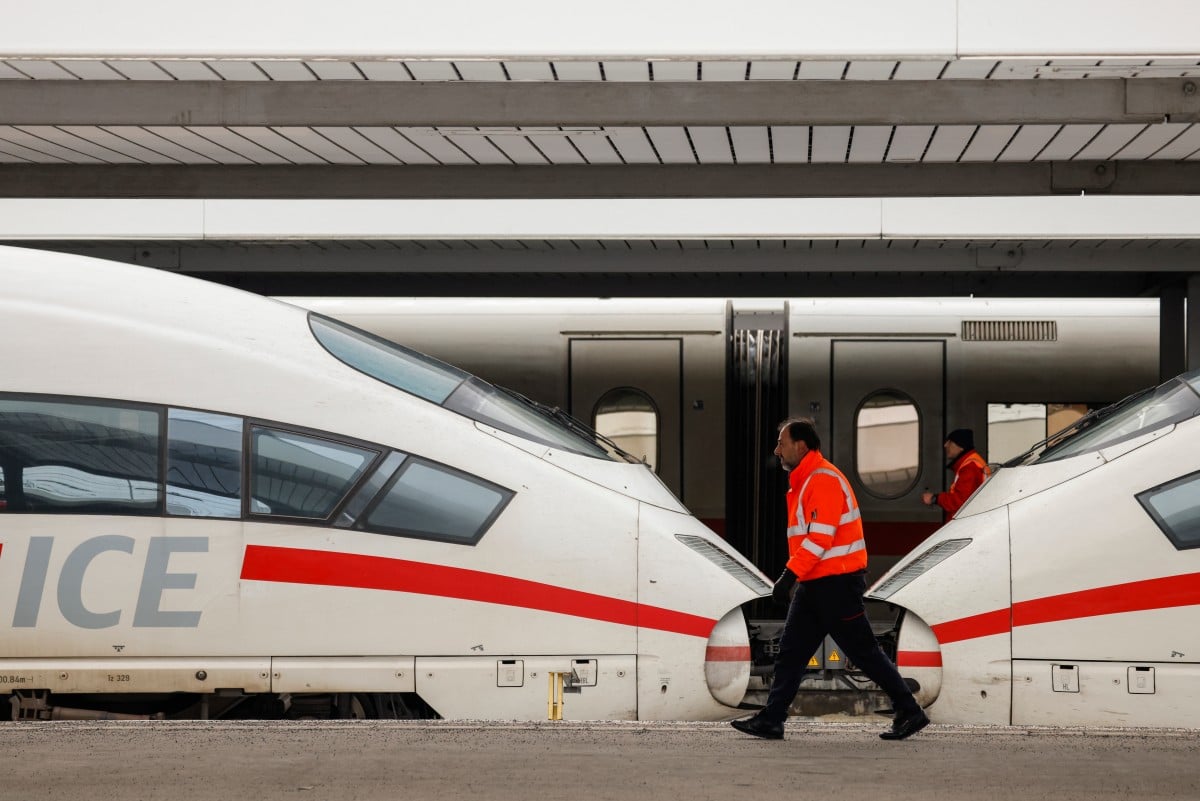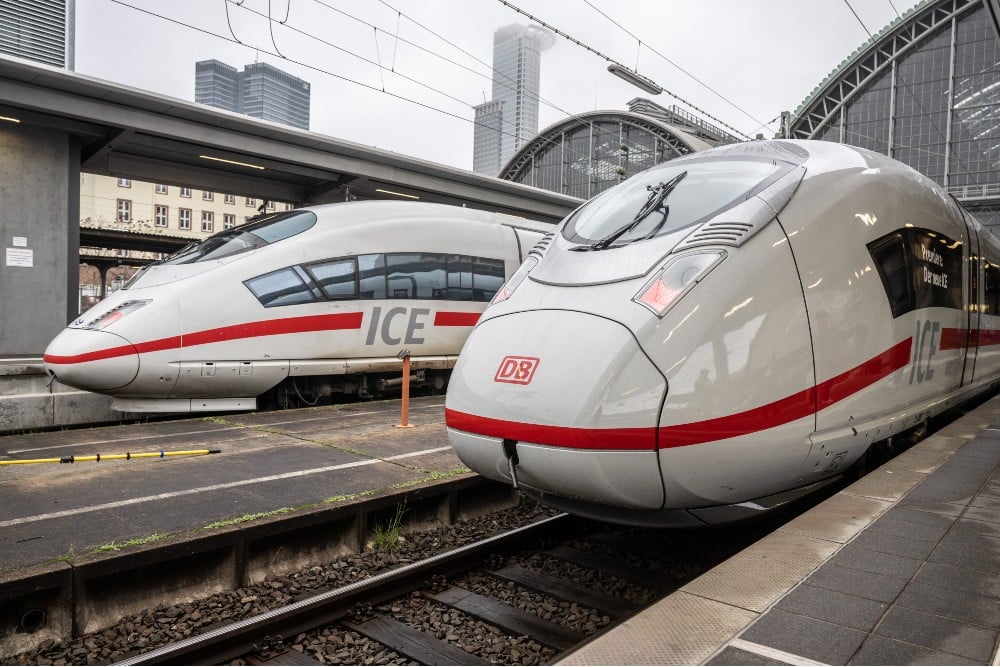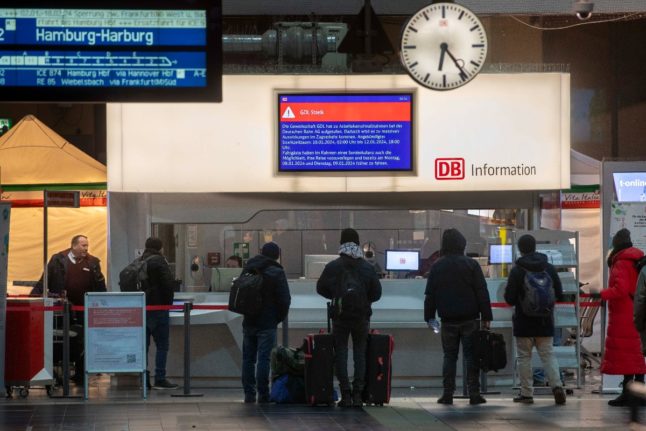Negotiations between the German Train Drivers’ Union (GDL) and Deutsche Bahn (DB) have failed to lead to an agreement, so the GDL has announced its longest strike to date. Passenger train drivers are expected to walk off the job from 2am Wednesday until 6pm on Friday.
While the strike will affect the Deutsche Bahn’s S-Bahn and regional services of most cities, some trains will still be running – though far less frequently. Here’s a look at how transport in Germany’s five largest cities is slated to be impacted, and which alternatives passengers have if a train is completely cancelled.
More detailed information on which lines/routes trains and buses will generally be running during the strike throughout Germany can be found on Deutsche Bahn’s website.
Berlin
Passengers in Berlin and neighbouring Brandenburg need to brace themselves for “massive disruptions to DB’s S-Bahn, regional and long-distance services” the Berlin S-Bahn announced on X.
“Please use alternative means of transport,” it said. There may also be restrictions before and after the strike. The Berlin S-Bahn has an emergency timetable with a greatly reduced basic service on some routes, which it published on its website.
The S1, S2, S25, S26, S41, S42, S45, S47, S7, S8 and S85 lines are not running. The S-Bahn has an emergency timetable every 20 minutes with a largely reduced service on some lines.
The Berliner Verkehrsbetriebe (BVG) are not affected by the warning strike. This means that buses, the U-Bahn, trams and ferries will continue to run on all lines from Wednesday to Friday. Passengers should nevertheless be prepared for more packed trains and longer waiting times.
On some sections of regional rail services, trains and buses will be used as replacement services (Ersatzverkehr) at selected times. Passengers can view the journey times in the VBB timetable information and VBB app.
Munich
“We expect the first disruptions to S-Bahn services from 11pm on Tuesday evening, January 9th,” wrote S-Bahn München on its website. “These will continue into the night on Friday/Saturday.”
The S-Bahn said that it wants to run trains at least every hour. However, it will only be possible to reach the Munich Airport with S1. Up-to-date information is available in the “München Navigator” app or on its website.
Local independent railway companies are only indirectly affected, such as the companies Go Ahead Bayern (including Munich – Lindau) and Bayerische Regiobahn (including Munich – Oberland).
While their own staff are not on strike, train services may still be restricted if signalmen or dispatchers also strike, explained Go Ahead Bayern. In addition, trains are expected to be fuller than usual. Passengers should therefore check online shortly before travelling.

Frankfurt
Many trains and S-Bahn trains are set to be cancelled in the Rhine-Main region. Buses, trams and underground trains, however, should not be affected. Some city transport lines in Frankfurt will be reequipped with additional coaches or larger buses.
However, regional transport service RMV reported on Tuesday that individual journeys will have to be cancelled on many bus routes as many employees are off sick.
There is already some information about the emergency timetable for train services in Hesse on the Deutsche Bahn website.
Many train lines in Hesse will be completely cancelled during the rail strike:
RE5: Frankfurt – Hanau – Wächtersbach – Fulda – Bad Hersfeld (-Bebra).
RE16: Frankfurt – Friedrichsdorf – Friedberg
RE20 / RB22: Frankfurt – Niedernhausen – Limburg.
RB48: Frankfurt – Friedberg – Nidda.
RB51: Frankfurt – Hanau – Wächtersbach (- Bad Soden-Salmünster)
RB67: Frankfurt – Darmstadt – Bensheim – Schwetzingen (- Hockenheim): The service will be cancelled.
RB68: Frankfurt – Darmstadt – Bensheim – Heidelberg (- Wiesloch-Walldorf): Service will be cancelled.
These lines will experience delays:
The RE22 will run every 2 hours between Frankfurt-Höchst and Limburg and will also stop at all en route stations between Niedernhausen and Frankfurt-Höchst.
RE30: Frankfurt – Gießen – Marburg – Treysa – Kassel: Trains run every 2 hours between Frankfurt and Marburg.
RB34: Frankfurt – Bad Vilbel – Nidderau – Glauburg-Stockheim: Trains will run every 2 hours between Glauburg-Stockheim and Bad Vilbel. Trains will not run between Bad Vilbel and Frankfurt. Bus route 30 can be used between Bad Vilbel station and Frankfurt Sachsenhausen Hainer Weg.
RE50: Frankfurt – Hanau – Wächtersbach – Fulda: Trains will only run every hour between Hanau and Fulda, but will stop at all stations in between. Delays may occur. Trains between Hanau and Frankfurt will be cancelled.
RB51: Frankfurt – Hanau – Wächtersbach (- Bad Soden-Salmünster)
RE60: Frankfurt – Darmstadt – Bensheim – Mannheim: Trains run every hour between Frankfurt, Darmstadt and Mannheim according to the construction site timetable.
RB61: (Frankfurt -) Dreieich-Buchschlag – Rödermark-Ober Roden (- Dieburg): Trains run every 2 hours between Frankfurt and Dieburg.
Trains operated by Cantusbahn, Hessische Landesbahn (HLB), VIAS and Vlexx are expected to run. There are some express buses in the Rhine-Main region and Hesse, recognisable by the X in the line number.
Deutsche Bahn recommends that passengers use these to reach their destination.

Cologne
Even if Cologne’s privately operated National Express trains are not directly affected by the rail strike, there may be delays and cancellations for the rail operator starting on Wednesday. The reason for this is that DB Netz employees could join the strike call and therefore there may be isolated cases where signal boxes are not manned, National Express announced in Cologne on Monday.
This applies to the North Rhine-Westphalian lines RE 1 (RRX), RE 5 (RRX), RE 6 (RRX), RE 11 (RRX), RE 4 as well as RB 48 and RE 7.
The company emphasised that the trains will run as scheduled in regular service. However, due to the strike and the associated extensive train cancellations, passengers can expect very full trains.
National Express called on travellers to inform themselves about the situation before setting off, for example via the the local zuginfo.nrw website.
Hamburg
The Hamburg S-Bahn expects massive restrictions, as was the case with the previous GDL strikes in early December and mid-November. From Wednesday, an emergency service will be set up on the individual S1, S2, S3 and S5 lines so that, in the best case scenario, an S-Bahn train will run every 20 minutes.
The railway will provide further information on the emergency timetable in the course of Tuesday. However, this emergency timetable will only ensure a very limited train service. Deutsche Bahn is therefore asking all passengers to refrain from unnecessary journeys on the strike days and to postpone their journey to a later date.
Things are getting more complicated for regional transport, as not only Deutsche Bahn is on strike around Hamburg, but also other railway companies that are not on strike. However, there is an emergency plan that will take effect from Wednesday.
“DB is using longer trains with more seats for these journeys in order to get as many people as possible to their destination. Nevertheless, we cannot guarantee a journey,” the company announced.
The regional trains from Lübeck to Hamburg are running, but at least every third connection is cancelled. The situation is similar for the commuter connection between Bremen and Hamburg, where individual connections are also being cancelled.
The train connection to Sylt is even more severely affected: Every second train is cancelled. Between Kiel and Hamburg, too, only one in four trains is running during the day.



 Please whitelist us to continue reading.
Please whitelist us to continue reading.
Member comments